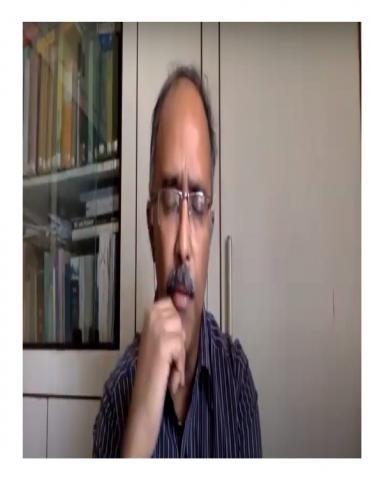Enrichment Lecture “Travel Writing: An Introduction” by Prof. Pramod K. Nayar

The Department of English organized a virtual Enrichment Lecture on 25 April 2020 with Prof. Pramod K. Nayar, renowned author and academician, from the University of Hyderabad, on the topic - “Travel Writing: An Introduction”.
Prof. Nayar began by describing the basic concepts of Travel Writing stating newness, novelty, wonder and exoticism as its core tenets, and stated that the initial purpose of writing travelogues was to guide the future travelers. He then catalogued the history of Travel Writing beginning with discovery and exploration writings which had at their heart the binary of the ‘discoverer’ (Europeans) and the ‘discovered’ (non-Europeans). He further elaborated on the idea of the binary that characterized all travel writing in the earlier times: discovery of the non-Europeans by the Europeans. Conquest narratives, too, were marked by this Self and Other dichotomy at two levels, viz. the acquisition of knowledge about a particular culture, followed by the actual military conquests. The ‘contact zones', he opined, were ‘uneven' in that there existed an incongruity between the language, value systems and perceptions of the two parties involved thereby making communication difficult. That the discoverer was always associated with a European identity was exemplified by Prof. Nayar's reference to the case of Robert Henson, the non-white aid to a white explorer.
Prof. Nayar further elaborated on how all travel writings become sites for cultural interaction, an idea referred to by Mary Louise Pratt as ‘transculturation’. Such writings are marked by journey: both outside and within, as the traveller discovers himself too in this process. He also dwelt at length on the anti-conquest travelogues and ‘footsteps travel’, emphasizing on how travel also implied not only a communion with other people and cultures but with one's inner self as one makes sense of his/ her response to changed circumstances. A vital component of Travel Writing that he touched upon was that of ‘informed enchantment’, an enchantment or a sense of wonder underwritten with a subtext of fore-knowledge (most travellers being already aware of the places they have ‘visited’ through books) which often interrupts with a raw perception that could have occurred otherwise. The session ended with an interesting round of questions and observations, from the students and faculty members alike, on the idea of humanizing distances and how no one writer or account can offer the exact version.

